Overview:
Digital Product Passports (DPPs) serve as comprehensive digital records that detail a product's lifecycle, promoting transparency and accountability in response to rising consumer demand for sustainability and ethical practices. The article highlights that DPPs not only enhance consumer trust and compliance with regulations but also help businesses strategically align with eco-friendly standards, thereby minimizing the risk of greenwashing and fostering responsible consumption.
Introduction
In an era where sustainability has become a focal point for consumers and businesses alike, Digital Product Passports (DPPs) are emerging as a pivotal solution. These comprehensive digital records provide essential insights into a product's lifecycle, from its origin and materials to its sustainability credentials. As consumer awareness grows, particularly among younger demographics, the demand for transparency and corporate responsibility intensifies.
With statistics revealing that a significant percentage of consumers prioritize brands with strong sustainability practices, organizations are compelled to adapt. This article delves into the transformative role of DPPs across various industries, exploring their impact on supply chains, regulatory compliance, and practical applications, while also highlighting the innovations shaping their future.
What Are Digital Product Passports and Why Do They Matter?
Dpps, or Digital Product Passports, function as thorough digital records that outline a product's complete lifecycle, including its origin, materials utilized, and environmental credentials. These passports are essential for promoting transparency and accountability as part of dpps across various industries, particularly due to the rising demand for ethical and sustainable practices. According to Generation Investment Management, 65% of individuals aged 18-30 favor brands with robust environmental credentials, emphasizing the increasing demand for corporate accountability.
Furthermore, 61% of consumers aged 30 or younger have encountered eco-friendly clothing brands' messaging, indicating a greater awareness of environmental issues among younger demographics. Current statistics indicate that 61% of executives acknowledge that climate change will significantly influence their strategic operations over the next three years, further demonstrating a shift towards eco-friendliness. Moreover, poor environmental practices can alienate customers, with 84% citing a poor environmental track record as a major reason for turning away from a brand.
In the European Union, data protection policies are integrated into a larger initiative designed to bolster the circular economy, emphasizing the necessity for businesses to acknowledge their importance. By adopting data protection practices, companies can not only improve client trust but also meet regulatory requirements, thereby aligning their operations with modern environmental standards.
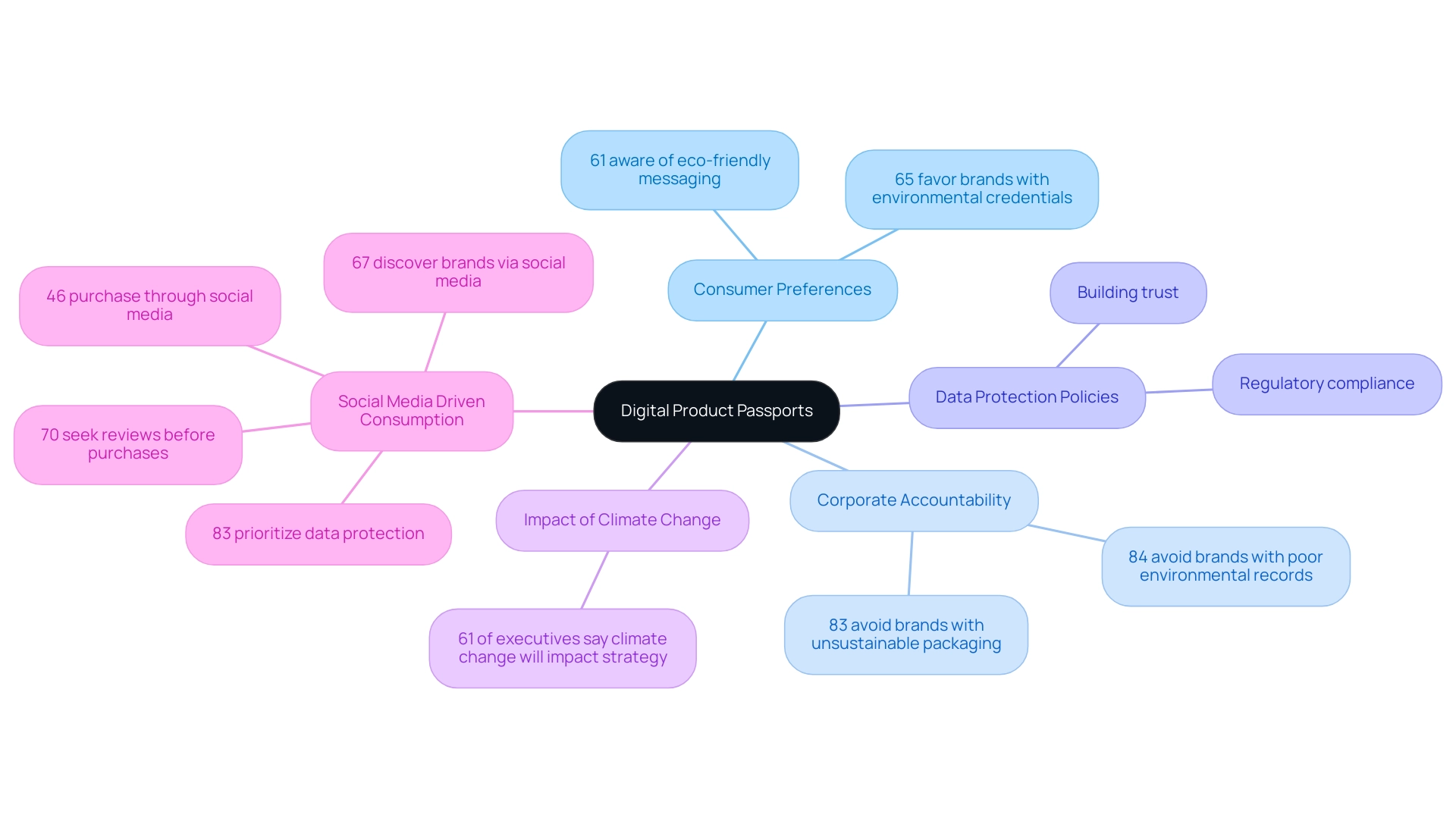
Transforming Supply Chains: The Role of DPPs in Sustainability
Digital Item Passes, or dpps, play a crucial role in transforming supply chains by providing a clear and credible record of an item's lifecycle, from raw materials to the final buyer. This level of transparency is crucial as it allows organizations to exhibit their commitment to sustainability and ethical practices, effectively minimizing the risk of greenwashing accusations. As KPMG professionals note,
In 2024, organizations could gain fundamental opportunity by focusing on the strategic application of GenAi and enhancing supply chain transparency.
However, it is important to recognize that measurement and reporting challenges arise from a lack of universally accepted metrics for ESG indicators, which can hinder the effectiveness of transparency initiatives. By providing individuals with detailed information about product origins and their environmental effects, these programs enable informed buying choices. This shift not only encourages individuals to make more responsible choices but also propels industries toward sustainable practices.
Additionally, the share of respondents reporting supply chain risks regularly has significantly decreased, dropping from nearly 50% to 25%, underscoring the need for improved transparency and accountability. Recent applications of these frameworks illustrate their effectiveness in promoting eco-friendliness, demonstrating that companies adopting these methods are better positioned to build consumer trust and reduce accusations of greenwashing. The case study titled 'Sustainability Integration' exemplifies this, as it showcases how companies can incorporate ecological practices at every step of their logistics processes, ultimately minimizing environmental impact.
Additionally, Sayari Innovations considers 2024 a year of product expansion, emphasizing the progress in digital product platforms (dpps) and their influence in steering wider industry trends towards environmental responsibility.
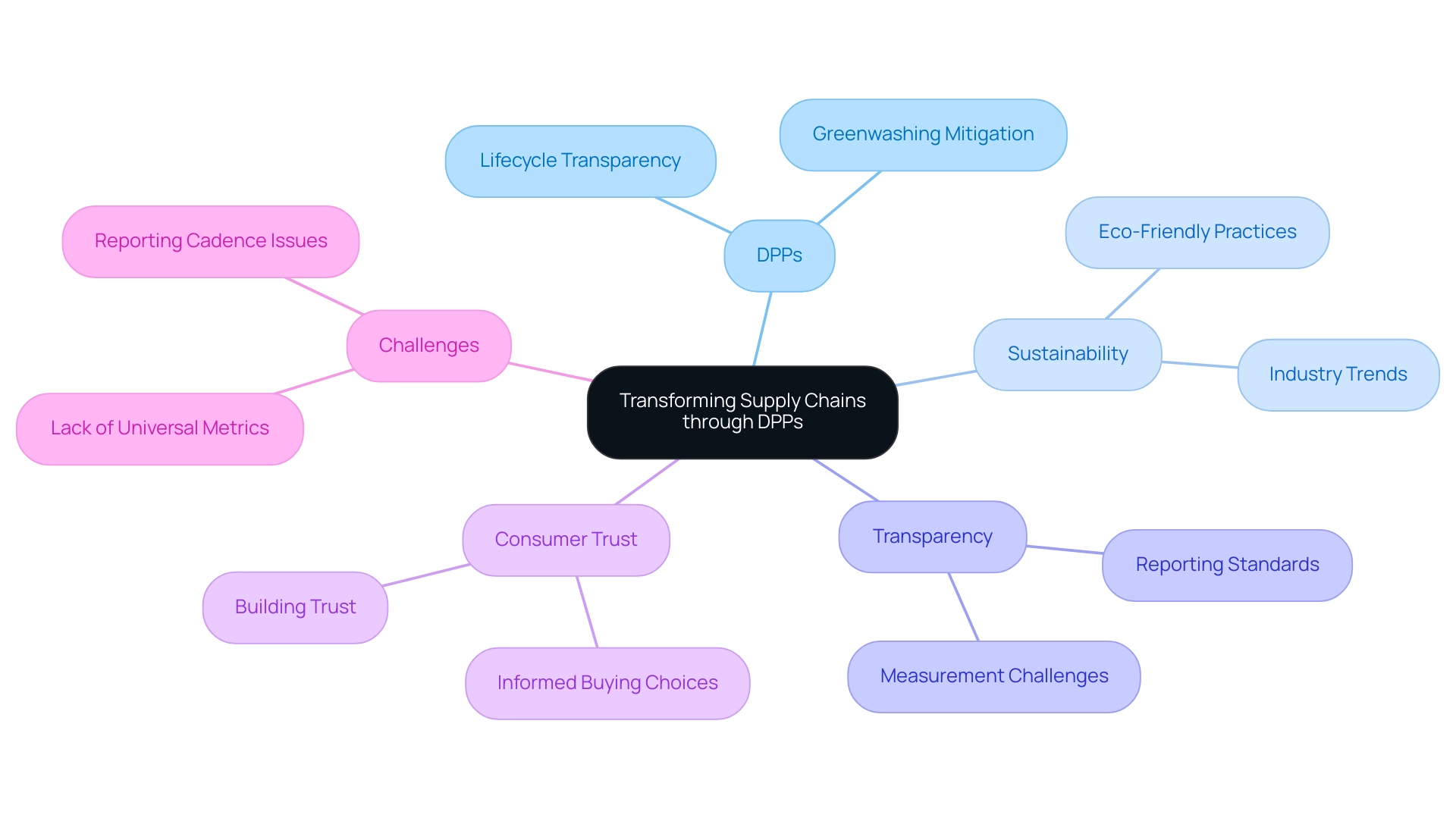
Navigating the Regulatory Framework for Digital Product Passports
The regulatory landscape for Digital Product Passports in the European Union is undergoing significant transformation. Central to this evolution are key legislative measures such as the EU's Green Deal, alongside various product-specific directives that delineate the standards for DPP implementation. A significant regulatory pressure includes the ESPR's prohibition on destroying unsold clothing and footwear, which emphasizes the urgency for businesses to adjust to new eco-friendly standards.
Businesses must remain vigilant and well-informed regarding these regulations to ensure compliance and mitigate the risk of legal repercussions. The importance of understanding these guidelines extends beyond mere compliance; it plays a crucial role in the successful integration of DPPs into the existing operations. As highlighted by Mattias Steinbichler, Group Director of Expansion & Data Partners at BIMobject:
This transition is driven by organized, digital, and practical information that ensures offerings meet environmental standards and gain visibility with specifiers.
The case study titled 'Effects of Digital Product Passports on the Construction Industry' illustrates how new regulations are increasing the demand for data in the construction sector, where 80% of an item's environmental impact is determined at the design stage. By utilizing data protection protocols, businesses not only comply with evolving regulations but also position themselves strategically in a competitive landscape, ultimately enhancing their operational efficiencies and sustainability outcomes. As regulatory frameworks continue to tighten, particularly with the anticipated developments in 2024, including significant product launches aimed at connecting construction stakeholders, staying updated is essential for capitalizing on the benefits of DPPs compliance.
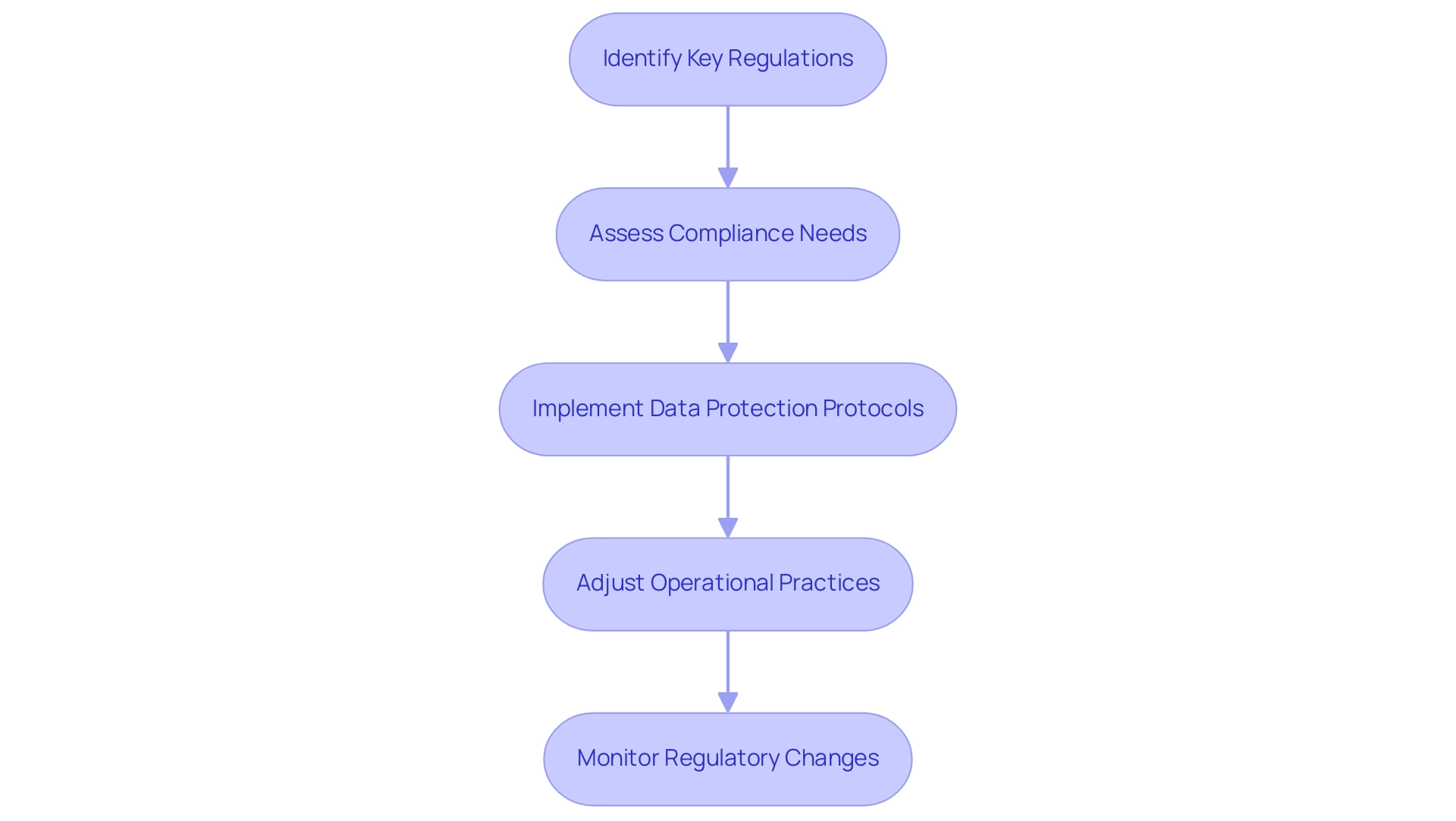
Practical Applications of DPPs Across Industries
Digital Product Passports, or dpps, act as versatile tools with significant applications across various sectors, including fashion, electronics, and food. In the fashion sector, brands can employ dpps to provide consumers with extensive information about their sourcing, production techniques, and eco-friendly efforts. This transparency not only fosters trust but also aligns with an increasingly eco-conscious market.
For instance, companies like Coach and Tod's have begun integrating digital IDs into their items, logging vital information about the materials used and their sustainability efforts. CricKet emphasizes that digital processing platforms can automatically create and evaluate Life Cycle Assessments (LCAs) for items, showcasing notable enhancements in environmental impact from season to season. In the electronics industry, producers are utilizing strategies to inform users about the recycling potential of materials and the energy efficiency of their products.
This approach not only promotes responsible consumption but also enhances brand loyalty. Furthermore, in the food sector, such practices provide critical information regarding ingredient sourcing and adherence to safety standards, thereby strengthening trust and loyalty among buyers. However, the implementation of such policies is not without challenges.
A case study titled 'Challenges in Implementing Digital Product Passports' reveals that issues such as consumer education on interpreting dpps, the necessity for advanced technological infrastructure, and the complexities of regulatory compliance across different regions can hinder their effectiveness. Despite these obstacles, industry leaders, as noted by CricKet, recognize that embracing digital product passports (dpps) is not merely a regulatory necessity but a strategic opportunity to lead the charge toward sustainable practices across all sectors.
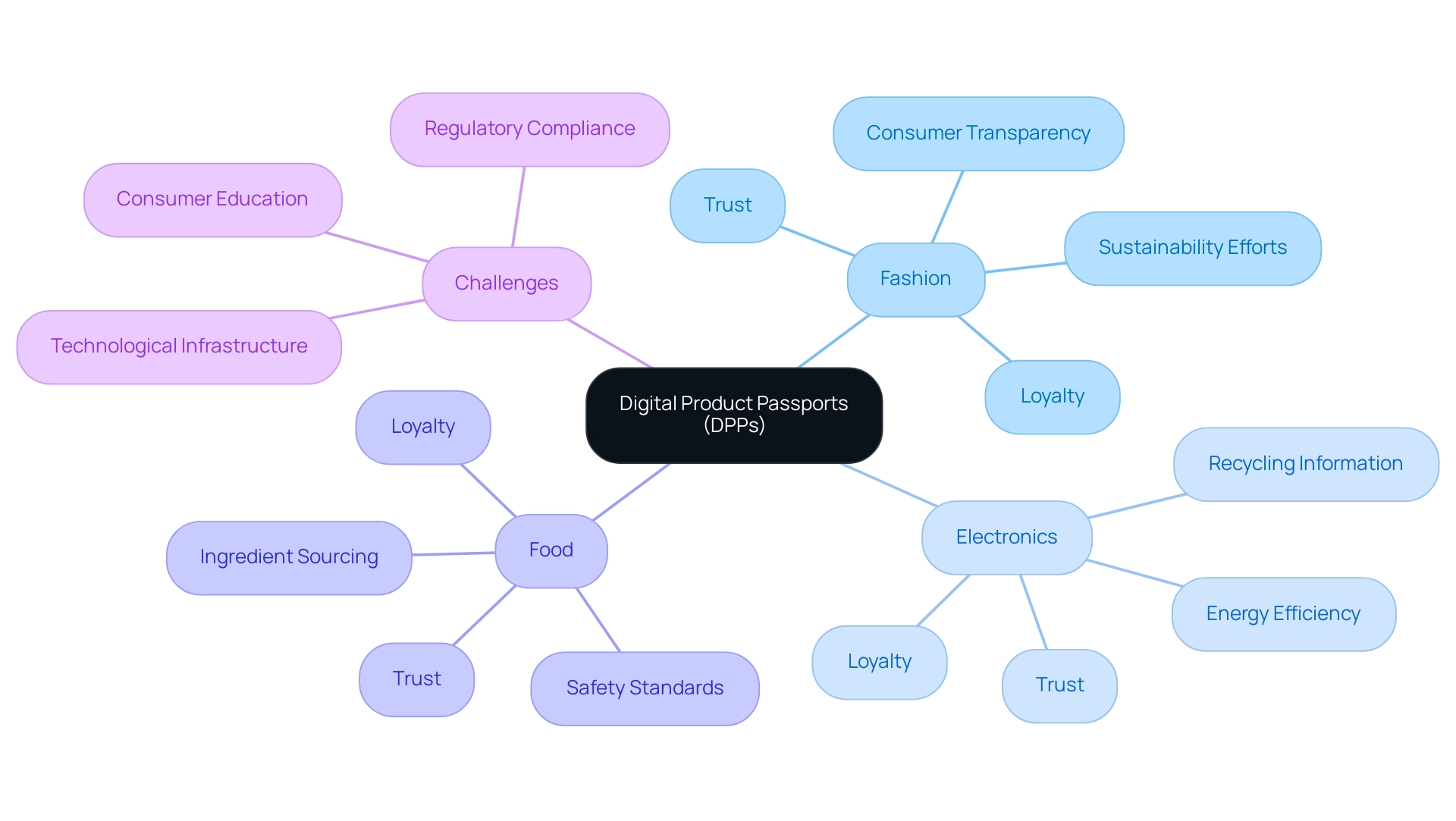
The Future of Digital Product Passports: Trends and Innovations
The future of dpps is set for significant transformation, largely driven by advancements in technologies such as blockchain. This innovation enhances the integrity and security of data related to dpps, ensuring that information about origins, materials, and environmental impact is reliable. As sectors progressively implement digital transformation strategies, the global inventory management software sector is projected to expand at a CAGR of 13.1% throughout the forecast period, signifying strong market significance for digital products.
Furthermore, dpps are anticipated to incorporate more real-time data, facilitating dynamic tracking of products throughout their lifecycle. Recent developments among key players show a trend towards consolidation and integration of digital passport capabilities into broader enterprise systems, driven by regulatory pressures and technological innovations. As public expectations for transparency continue to rise, these digital passports will become increasingly vital in promoting sustainable business practices and ethical consumption.
Sudip Saha, Managing Director and Co-Founder at Future Market Insights, emphasizes that "dpps are essential for sustainability initiatives and regulatory compliance in several organizations." This underscores the critical role DPPs will play in meeting regulatory pressures and enhancing consumer trust in the years to come.
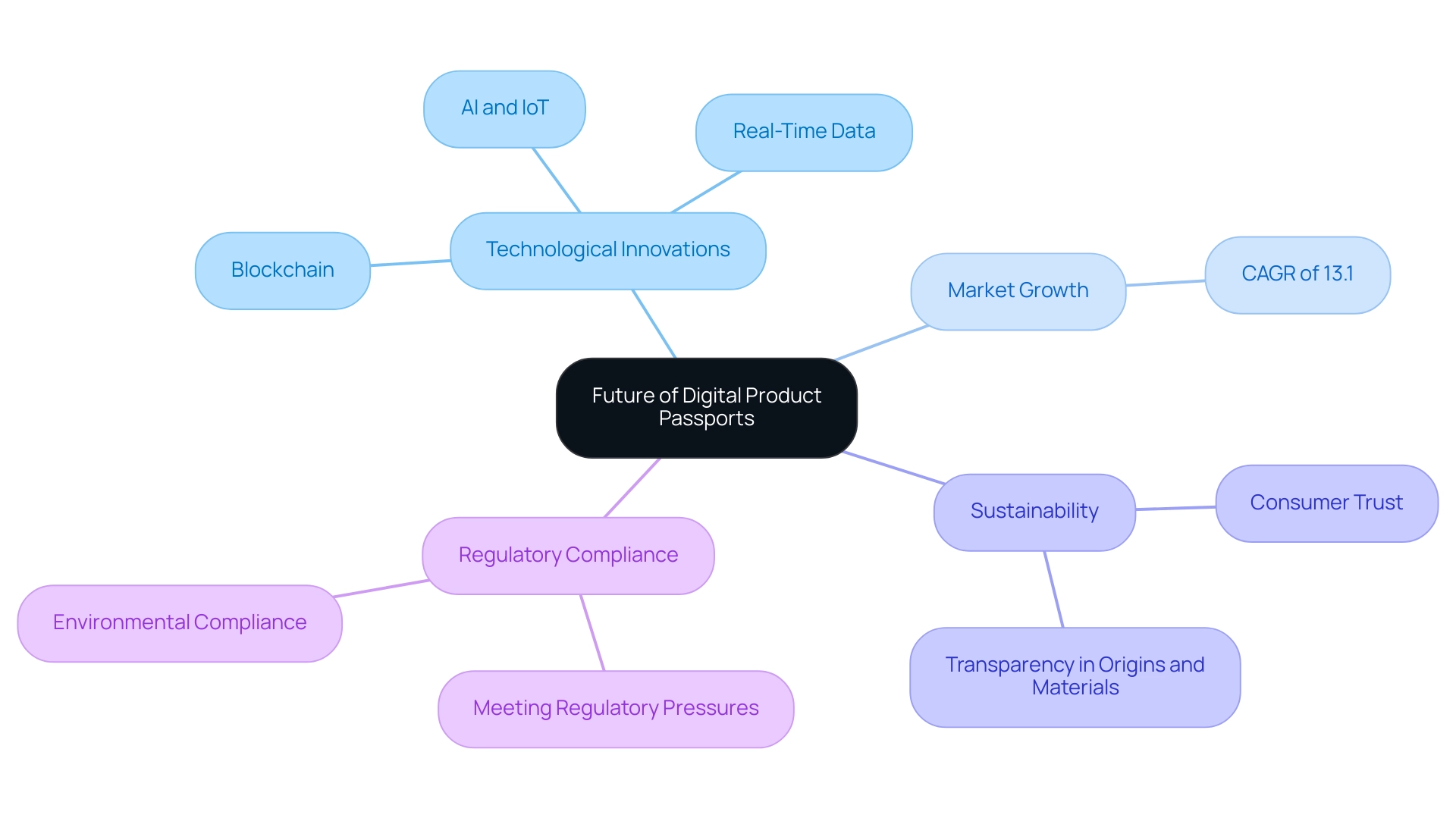
Conclusion
Digital Product Passports (DPPs) are quickly becoming a cornerstone of sustainable business practices across various industries. By providing detailed insights into a product’s lifecycle—from its origin and materials to its sustainability credentials—DPPs foster transparency and accountability. As consumer demand for ethical practices grows, particularly among younger demographics, companies that embrace DPPs position themselves favorably in a competitive marketplace.
The integration of DPPs into supply chains not only enhances transparency but also mitigates the risks associated with greenwashing. As organizations navigate an evolving regulatory landscape, understanding and implementing DPPs becomes crucial for compliance and operational efficiency. The practical applications of DPPs in sectors like fashion, electronics, and food showcase their versatility in promoting responsible consumption and building consumer trust.
Looking ahead, technological advancements, particularly in blockchain, will further enhance the reliability and security of DPP data. As industries adapt to these innovations, DPPs will be essential in meeting rising consumer expectations for transparency and sustainability. The future of DPPs is not just about compliance; it represents a strategic opportunity for businesses to lead in sustainable practices and reinforce their commitment to corporate responsibility. Embracing DPPs today will pave the way for a more sustainable and accountable tomorrow.



